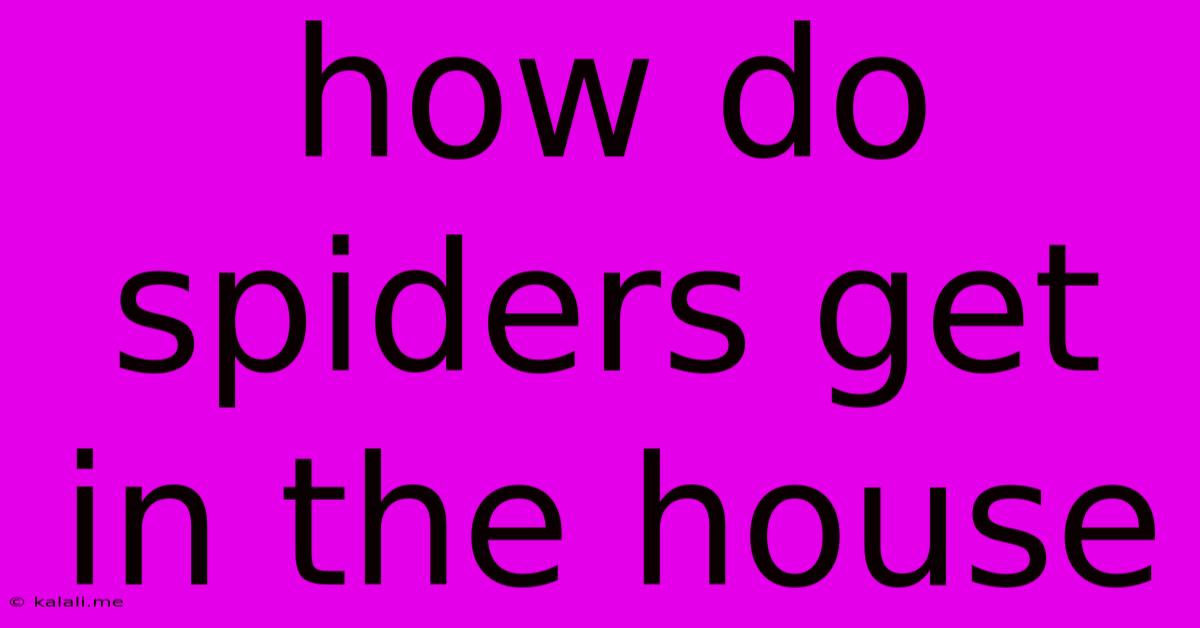How Do Spiders Get In The House
Kalali
Jun 10, 2025 · 3 min read

Table of Contents
How Do Spiders Get in the House? A Comprehensive Guide
Spiders in the house are a common nuisance, causing unease for many homeowners. Understanding how these eight-legged creatures infiltrate our homes is the first step to effective prevention. This article will explore the various entry points spiders utilize, common spider species found indoors, and practical methods to keep them out.
Why are spiders in my house? Simply put, spiders seek shelter, food, and a place to reproduce. Your home provides all three: warmth, protection from predators, and ample sources of insect prey.
Common Entry Points for Spiders
Spiders are remarkably adept at squeezing into tiny spaces. Here are some of the most frequent routes they take:
- Open Doors and Windows: This seems obvious, but it's the most common entry point. Even slightly ajar windows or doors provide ample opportunity for spiders to enter.
- Gaps and Cracks: Inspect your home's exterior for cracks in the foundation, around pipes, windows, and doors. These tiny openings are perfect for spiders to crawl through. Pay close attention to areas around utility lines.
- Ventilation Systems: Vents, chimneys, and other openings provide direct access to the interior of your house. Small spiders can easily navigate through these systems.
- Attached Garages and Sheds: If your garage or shed is connected to your house, it can act as a pathway for spiders to enter.
- Plants and Woodpiles: Bringing plants or firewood inside can inadvertently introduce spiders into your home. Thoroughly check these items before bringing them indoors.
- Through the Mail: While less common, packages and mail can sometimes harbor spiders, especially those delivered from rural areas.
Common House Spiders: Identifying the Intruders
Knowing which spiders are likely to invade your home helps in understanding their behavior and implementing appropriate preventative measures. Some common house spiders include:
- Cellar Spiders (Daddy Longlegs): These small, long-legged spiders are often found in dark, damp areas like basements and closets. They are generally harmless.
- Cobweb Spiders: These spiders spin messy webs in corners and ceilings. They are usually small and not aggressive.
- Jumping Spiders: These spiders are known for their remarkable jumping ability and are often found on walls and windows. They are usually harmless.
- Wolf Spiders: These larger spiders are more likely to be found in basements or garages. While they have a fearsome appearance, they rarely bite.
Effective Spider Prevention Strategies
Prevention is key to keeping spiders out of your home. Here are some effective strategies:
- Seal Gaps and Cracks: Use caulk or sealant to fill any gaps or cracks in your home's exterior. This is crucial in preventing spider entry.
- Regular Cleaning: Regularly clean and vacuum your home, paying particular attention to corners, crevices, and areas where spiders like to build webs.
- Exterior Lighting: Reduce exterior lighting, as it attracts insects which in turn attract spiders.
- Keep Vegetation Trimmed: Trim back overgrown bushes and trees near your house to reduce spider hiding places.
- Screen Doors and Windows: Ensure your doors and windows have properly fitted screens. Repair any tears or holes.
- Natural Repellents: Some essential oils, such as peppermint and tea tree oil, are said to deter spiders. However, the effectiveness of these methods can vary.
By understanding how spiders enter your home and implementing effective prevention methods, you can significantly reduce the likelihood of unwanted spider guests. Remember, a clean and well-maintained home is a less attractive environment for spiders.
Latest Posts
Latest Posts
-
2x4 Or 4x4 For Workbench Legs
Jun 10, 2025
-
Does Sneak Attack Work With Spells
Jun 10, 2025
-
Talking Too Much Without Saying Anything
Jun 10, 2025
-
I Wish I Were Or I Wish I Was
Jun 10, 2025
-
Ssh Keygen Ed25519 Key Fingerprint Use Rsa Fingerprint
Jun 10, 2025
Related Post
Thank you for visiting our website which covers about How Do Spiders Get In The House . We hope the information provided has been useful to you. Feel free to contact us if you have any questions or need further assistance. See you next time and don't miss to bookmark.